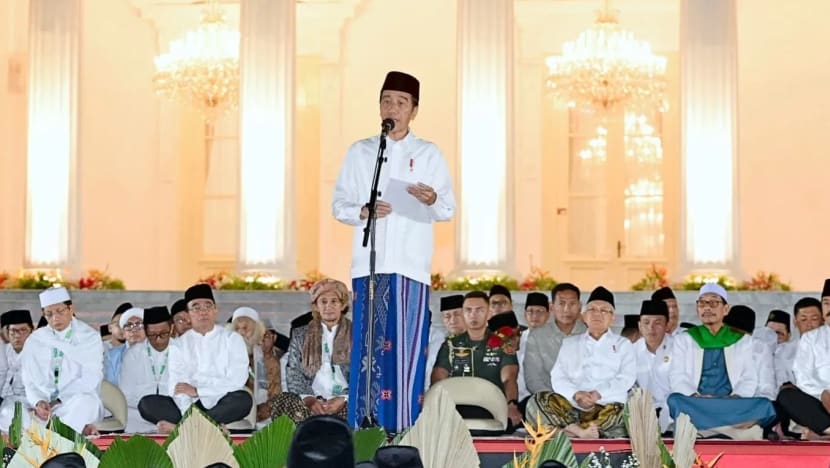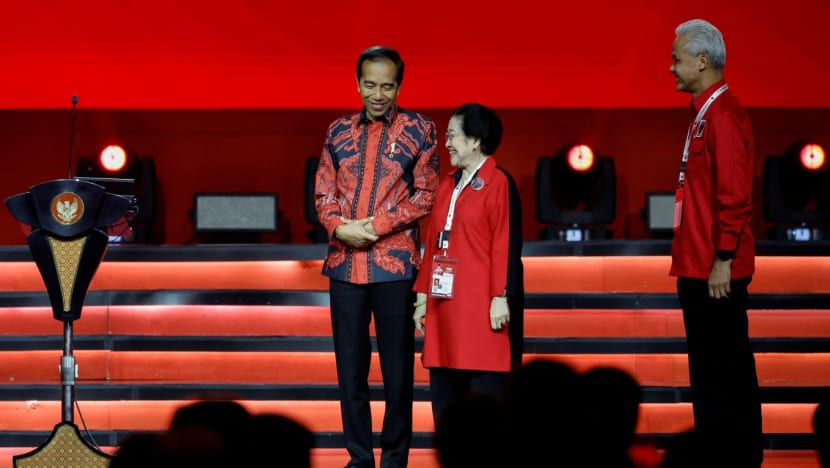Critics unswayed by Indonesian president Jokowi’s emotional apology; supporters hail ‘statesmanship’
Mr Joko Widodo apologised during a congregational prayer event at the Merdeka Palace in Jakarta, marking the first time the 63-year-old has done so during his presidency.


This audio is generated by an AI tool.
JAKARTA: His voice trembled as he apologised for mistakes made during his tenure, but critics of Indonesian President Joko Widodo are not buying it, with some calling his emotional apology a political play to gain sympathy.
Mr Widodo apologised during a congregational prayer event last Thursday (Aug 1) at the Merdeka Palace in Jakarta, marking the first time the 63-year-old leader has done so during his presidency.
The prayer event, which marks the start of Indonesia’s independence month, was broadcast and live-streamed across national television networks and online news platforms. Indonesia celebrates its National Day on August 17.
Mr Widodo’s voice trembled and he appeared on the verge of tears as he expressed regret for any shortcomings of his administration.
“With utmost sincerity and humility, allow Vice President Mr Ma’ruf Amin and me to sincerely apologise for any mistakes we may have made while carrying out the people’s mandate as president and vice-president,” Mr Widodo told around 3,100 attendees who included cabinet ministers and senior religious leaders.
“It was impossible for my government to meet all expectations and please everyone. I’m not perfect. I’m an ordinary human being. Perfection belongs to Allah alone,” said Mr Widodo.
He did not elaborate on the shortcomings, but some political parties as well as news outlet The Jakarta Post have flagged what they call a regression in democratic values under his watch.
SOME SCATHING, OTHERS SUPPORTIVE OF JOKOWI’S APOLOGY
Mr Widodo’s former party, the Indonesian Democratic Party of Struggle (PDI-P), had scathing remarks. Mr Widodo won the presidency twice, in 2014 and 2019, with the help of PDI-P’s party machinery.
PDI-P spokesperson Chico Hakim criticised the apology as coming too late and said: “We know there has been manipulation of our constitution to allow his eldest son to run as vice-president, and recently, it has happened again to allow his youngest son to become a political candidate for the upcoming regional election.”
Relations between Mr Widodo and the PDI-P, particularly its matriarch, Ms Megawati Soekarnoputri, soured after his older son, Mr Gibran Rakabuming Raka, became the vice-presidential running mate of Mr Prabowo Subianto, a candidate not backed by PDI-P, in the Feb 14 election.

Mr Prabowo, the current defence minister, won the presidential election by a landslide, beating PDI-P’s candidate Ganjar Pranowo and another challenger, Mr Anies Baswedan. Mr Prabowo will succeed Mr Widodo on Oct 20.
Mr Gibran's candidacy was made possible by a controversial ruling from the top court presided over by his uncle, former Chief Justice Anwar Usman.
The ruling allowed an elected public official to stand for president or vice-president even if he or she has not reached the minimum age of 40. Mr Gibran, 36, was the mayor of Surakarta, also known as Solo.
Mr Anwar Usman was later found guilty of a conflict of interest and demoted.
As for Mr Widodo’s younger son Kaesang Pangerep, speculation has intensified that he will run in November’s gubernatorial elections after a recent controversial decision by the General Elections Commission and a court ruling to tweak the minimum age for candidates.
Senior PDI-P executive Deddy Sitorus questioned the sincerity of Jokowi’s apology.
“I don’t know if he’s sincere this time or not. He might be putting on a show to gain sympathy, rather than genuinely apologising," he said.
PDI-P secretary general Hasto Kristiyanto told Tribunnews last Saturday (Aug 3) that rather than simply offering an apology to Indonesians, all of Mr Widodo’s policies must be accounted for.
On the other hand, former Jakarta governor Basuki Tjahaja Purnama, also known as Ahok, who is currently PDI-P’s economic chief, was more subdued in his remarks.
Ahok, who shares a close friendship with Mr Widodo and served as his deputy governor in Jakarta, told detikNews on Saturday that Mr Widodo’s apology was fair, appropriate and reasonable.
He noted that it is common for leaders to apologise at the end of their tenure.
Mr Widodo’s younger son Kaesang echoed similar sentiments and called his father’s apology a humane gesture.
“There are no perfect human beings in the world. I think it is a humane thing to offer an apology to the people of Indonesia as he prepares to retire,” said Mr Kaesang, who is currently chairman of the Indonesian Solidarity Party (PSI), as quoted by Antara news agency.
Mr Eddy Soeparno, secretary general of the National Mandate Party (PAN) – one of the parties in Mr Widodo’s ruling coalition – praised Mr Widodo as a statesman.
“He acknowledges that, as both a head of state and an ordinary person, he can certainly make mistakes. This is a form of statesmanship as he apologises for the shortcomings in his 10 years of governance,” Mr Eddy said.
Mr Habiburokhman, deputy chair of Mr Prabowo’s Gerindra party, also defended Mr Widodo, who is popularly known as Jokowi.
PDI-P only began criticising Mr Widodo in the past year after their rift emerged, he said. Prior to that, PDI-P members had praised Mr Widodo for over a decade, he highlighted.
“Why are they only saying that Jokowi caused damage after the split? Where is the common sense in that? The public is smart; they laugh at flip-flopping politicians,” he said.














